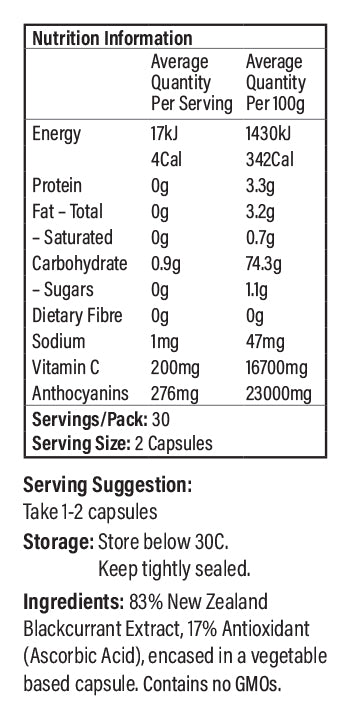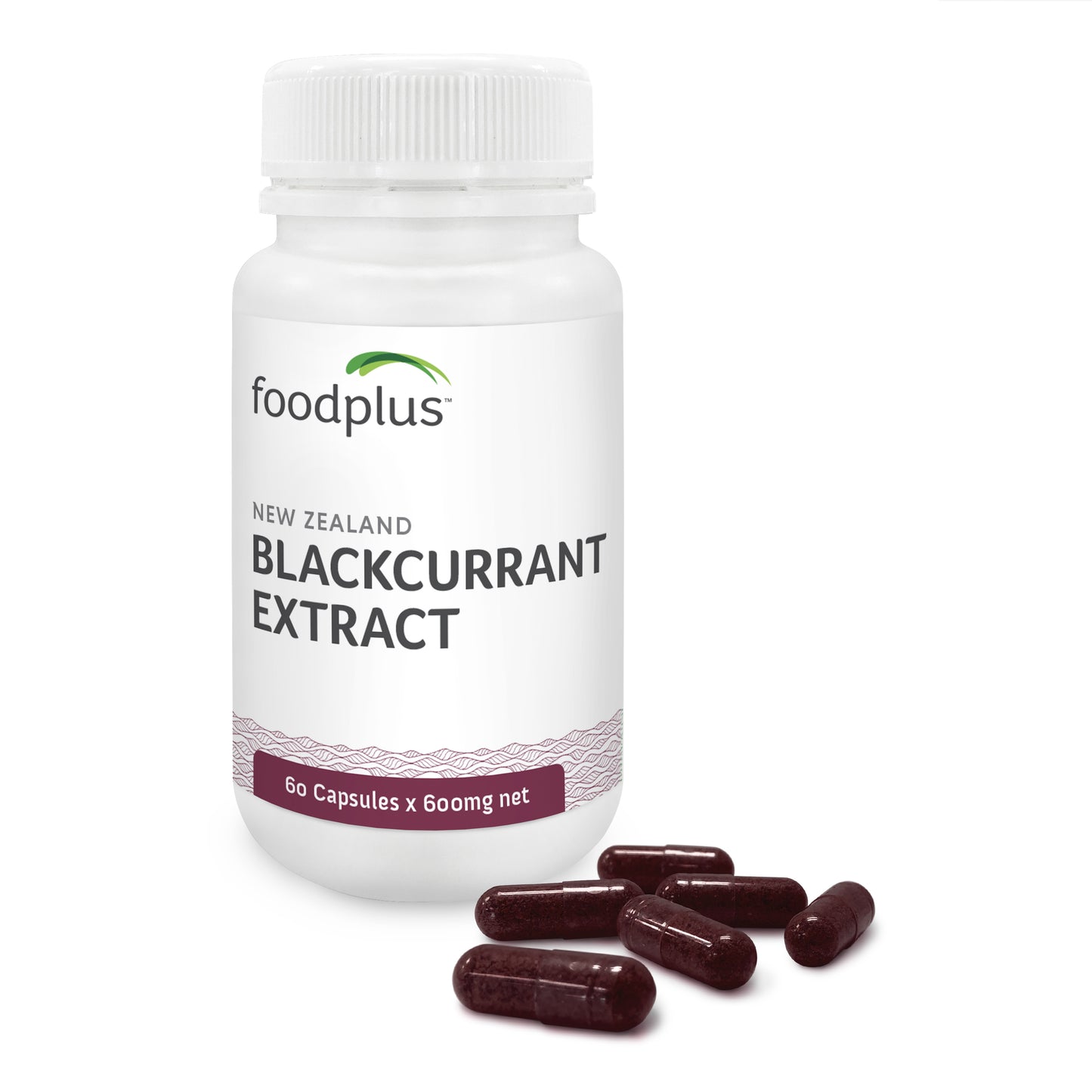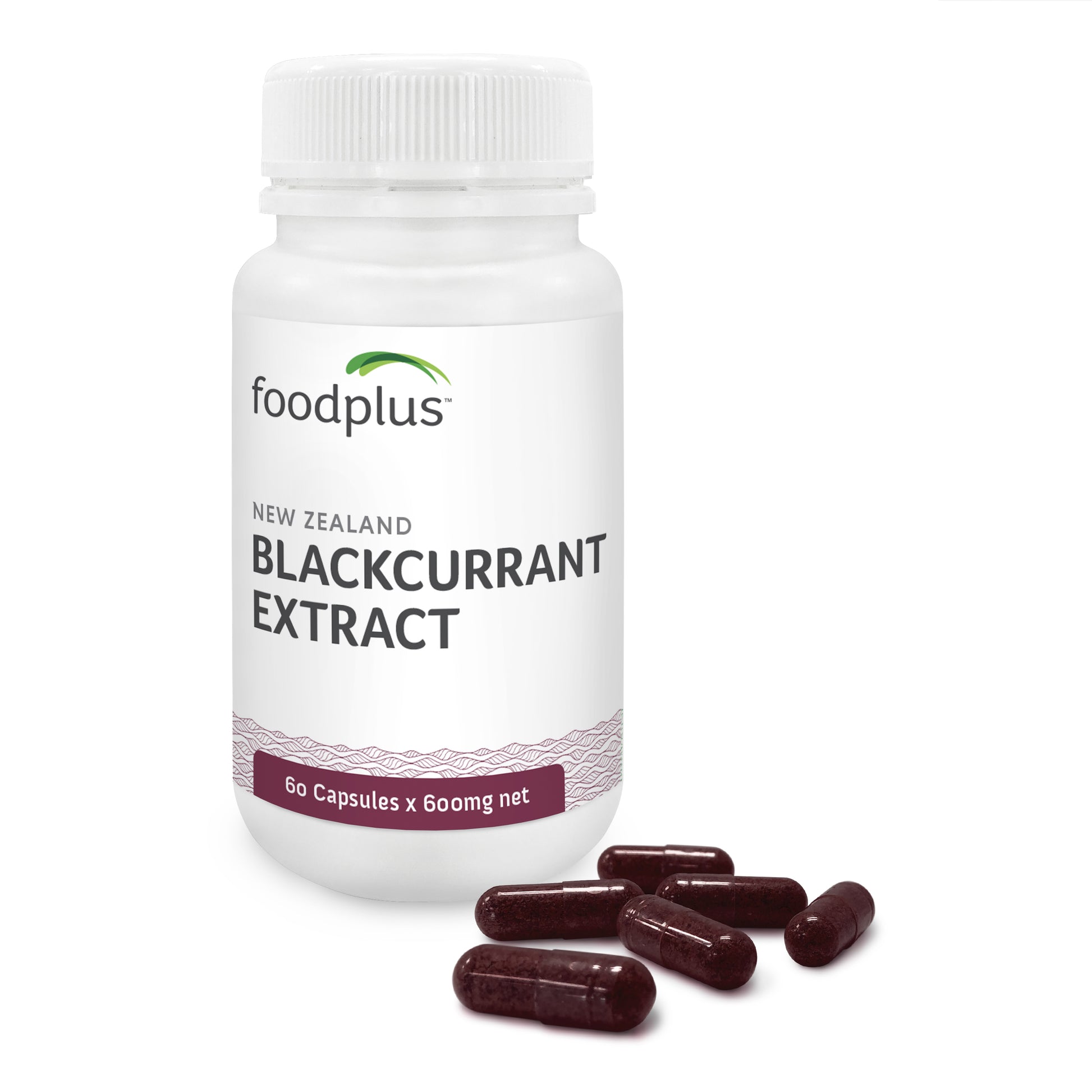Blackcurrant Extract Capsules


Blackcurrant antioxidant capsules are made from 100% New Zealand Blackcurrant Berries. This powder is standardised and stabilised and then packed into capsules for consumption as a powerful fruit antioxidant. Each pot contains 60 capsules, and each capsule contains 500 milligrams of NZ Blackcurrant Extract with 100 milligrams of Ascorbic Acid (Vitamin C) encased in a vegetable-based capsule.
The South Island of New Zealand has optimal conditions for blackcurrant (Ribes nigrum) growing. The severe cold of the winter and the strong sunlight with high ultraviolet content, enable the cultivation of blackcurrants which are nutritious, delicious and full of flavour.
Blackcurrants have one of the darkest blue/black/purple colour of all berry fruit. It is this wonderful deep dark colour that gives blackcurrants their amazing health-giving properties.
In relationship to other fruits blackcurrants are one of the most nutritious there are for humans to eat. Traditionally blackcurrants have been known for their Vitamin C content. The concentrations found in fresh blackcurrant berries are extremely high compared to all other fruits consumed within New Zealand. On average blackcurrants have 10-20 times more Vitamin C than other fruit.
Heart health
Blackcurrants may improve cardiovascular function, increase blood flow as well as reducing elevated total cholesterol and decreasing blood pressure.
Rich in anthocyanins
These pigments have been shown to be strong antioxidants.
Immunity
Blackcurrants are incredibly high in vitamin C which is essential for a healthy immune system. The anthocyanins may also assist in immune protection.
Sports Performance
Significant improvements in fatigue reduction and lactate clearance to allow for greater exercise intensity.
Eye Health
Studies have shown blackcurrants greatly reduce visual fatigue. Important in today's screen exposure.
Post-exercise recovery
Anthocyanins in blackcurrants may reduce muscle damage and soreness by speedier tissue repair.
Nutritional Information
Nutritional Information

Research
Research
Links to Key Articles
Blackcurrants are a Superfood
Blackcurrant Constituents.
Recent research has shown that the blackcurrant is “…bursting with more health-promoting antioxidants than most other vegetable and fruits, including blueberries…” Not only do they contain more vitamin C ‘weight for weight’ than a fresh orange, they are also packed with high levels of vitamins too. Research has also shown that these high levels of potent antioxidants have beneficial effects against a range of illnesses and conditions including heat disease, Alzheimer’s and the super-bug MRSA. Blackcurrants also contain several rare nutrients, like GLA (Gamma Linoleic Acid, a very rare Omega-6 essential fatty acid) and MAOI (Monoamine Oxidase Inhibitors).
Sports Recovery
Source: plantandfood.com
Researchers have found signs that an extract derived from New Zealand-grown blackcurrants – taken in capsule form before and after exercise – has three potential effects: minimising muscle damage by modulating oxidative stress, modulating inflammation and potentially enhancing the body’s natural defenses against disease. The findings are published in the ‘American Journal of Physiology – Regulatory, Integrative Comparative Physiology’.
Negative impacts from sustained sports training is a growing health issue. While exercise is universally agreed to be healthy, extreme exercise – such as intense pre-event training – can have some drawbacks, including lowering the body’s immune defenses and the increasing risk of muscle damage.
The Plant & Food Research study, lead by Dr Roger Hurst, looked at untrained individuals undergoing moderate exercise. It showed that those who took the blackcurrant extract exhibited reduced markers for oxidative stress linked to muscle damage and inflammation as well as increased activity linked to immune response.
In our research, we chose a group of ten healthy everyday people with a wide age range who exercised regularly and measured biochemical indicators to assess the effect of taking the blackcurrant extract capsules before and after exercise,” says Dr Hurst.
“We found changes in the levels of biomarkers that indicate antioxidant activity, inflammation modulating ability and a support for the natural immune responsiveness to potential pathogens."
The positive link between blackcurrants and exercise has been previously highlighted in studies in Japan where scientists evaluated the ability of NZ-grown blackcurrants to reduce inflammation in muscle groups related to sustained computer use and keyboard typing. This Japanese research flagged the potential of blackcurrants to reduce lactic acid build-up in muscles.
Dr Hurst says Plant & Food Research is yet to determine exactly what blackcurrant compounds cause the observed effects, but he doubts Vitamin C is a factor because the extracts tested contained only very low levels of the vitamin.
“We’re looking more closely instead at the role of flavanoids within the fruit. Flavanoids are antioxidants, including anthocyanins, the compounds that gives blackcurrants their brilliant black-red colour.”
New Zealand-grown blackcurrants are known to contain high levels of anthocyanins, which may be linked to the cultivars grown here or to environmental conditions.
The study was undertaken and funded by Plant & Food Research in support of a wider research programme called ‘New Berries’ funded by the Government and the New Zealand blackcurrant industry. This programme investigates the antioxidant and immune supportive properties of berryfruit and berryfruit products. It aims to use this knowledge to breed elite New Zealand berries with assured health-promoting properties that will have multiple end-uses including the development of functional foods.
Plant & Food Business Manager for Food Innovations Karl Crawford says the paper has generated strong interest from industry and has also highlighted new areas for further research.
“This is early stage research, which by its very nature often raises as many questions as it answers. That is certainly the case here. We know we’re on the right track in our belief that fruit extracts, combined with exercise, can have a beneficial effect on human health. In essence, this latest study is predictive – it is showing us where we need to look if we want to really maximise the health potential of fruit.
“We know fruit and vegetables are good for us, and science obviously has an in-depth understanding of fruit composition and the potentially beneficial effects of fruit compounds at a cellular level. This paper is part of one of the fastest growing areas in food and health research – looking to build knowledge that links those two areas of established science. It is exciting for consumers because the link for them will come in the form of new functional food products that deliver a proven, specific benefit to their health and wellbeing.
“We’re talking about the potential to focus wellness benefits from foods. That means moving from, say, broad claims about potential antioxidant function toward far more specific information about benefits and the mode of action behind them.”
Articles
Articles
Blackcurrant research reveals health benefits
at Medicalxpress.com - READ
Blackcurrants to help clear the mind
foodandplant.com - READ
DISCLAIMER
The links above are intended for educational purposes only.
Please use your own knowledge and judgment when reading any of the articles. Food Plus Ltd does not in any way provide any endorsement, assurances of accuracy or validity of the information and potential claims made.
They not intended to substitute for professional medical advice and if you have health concerns you should seek the advice of a qualified health professional.


